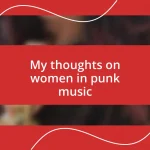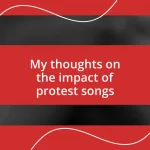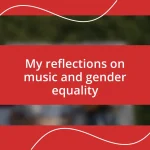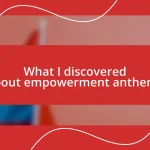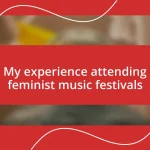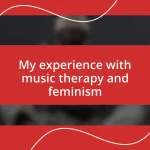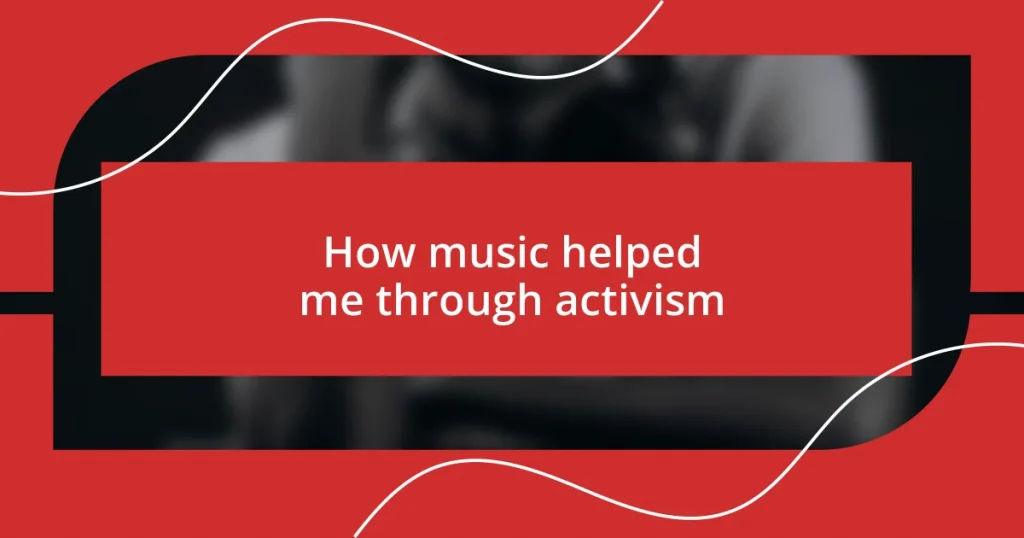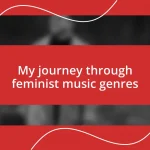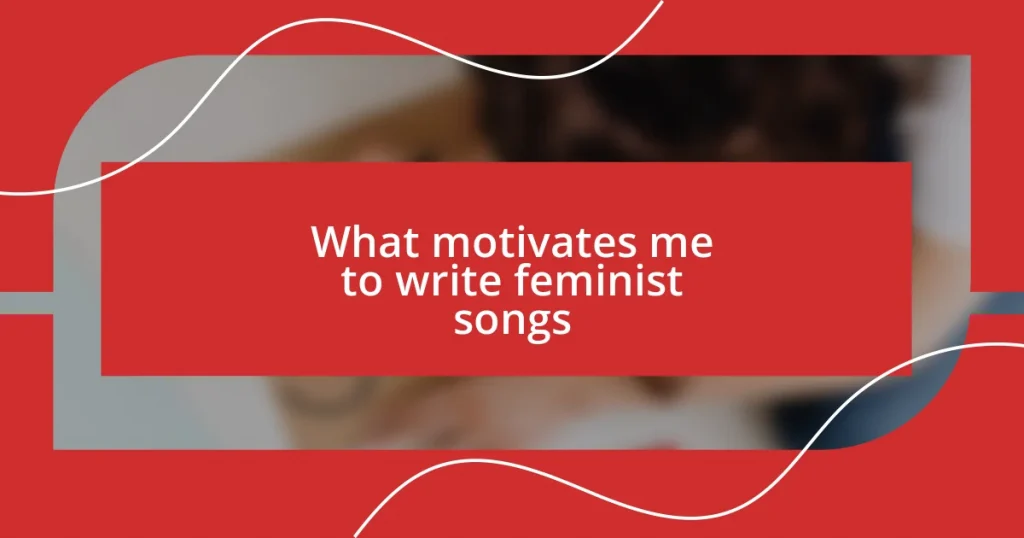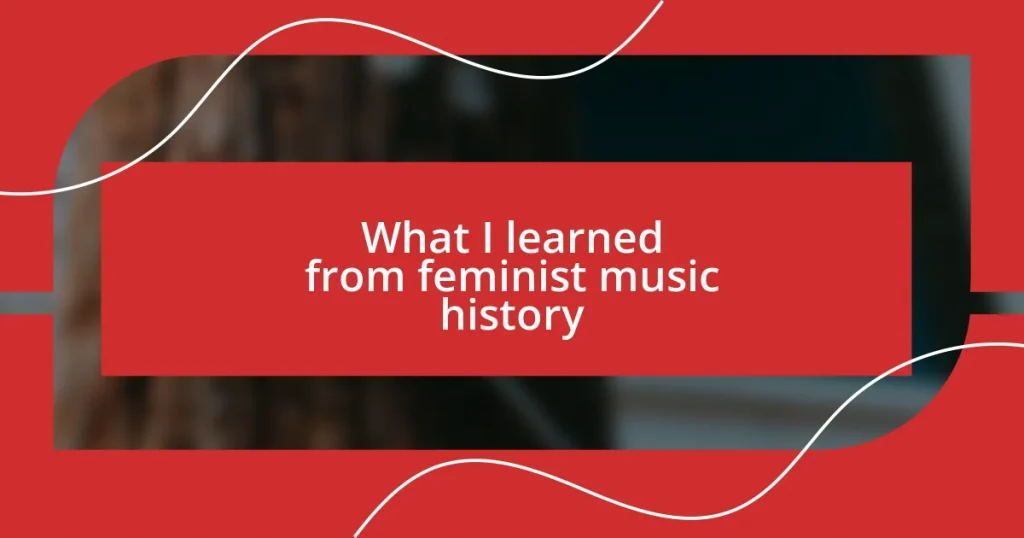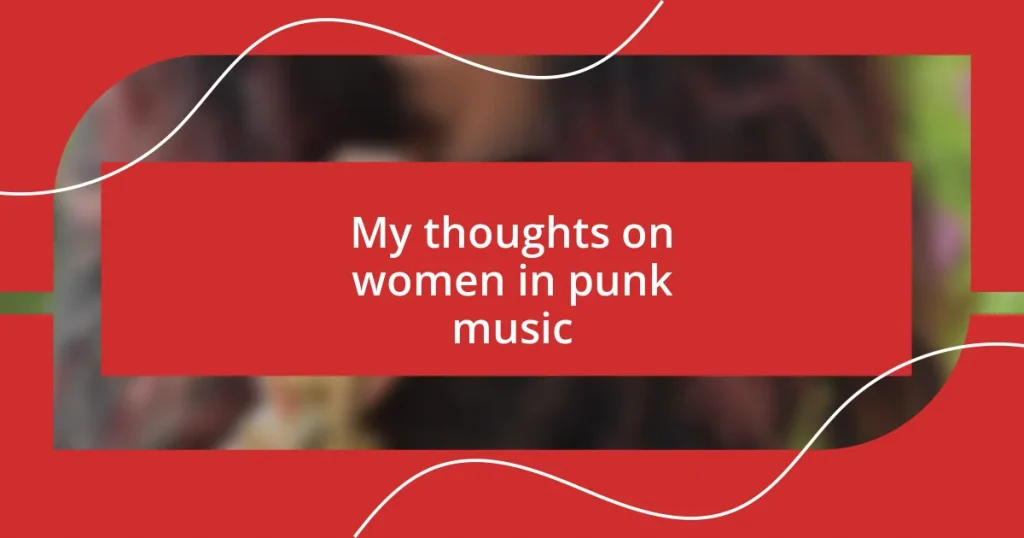Key takeaways:
- Music fosters community and solidarity among activists, enabling emotional expression and personal connection to social causes.
- Different music genres, such as hip-hop, folk, and reggae, inspire activism by amplifying messages of resistance and unity.
- Creating playlists for movements energizes participants, transforming individual efforts into a cohesive force for change during grassroots campaigns.
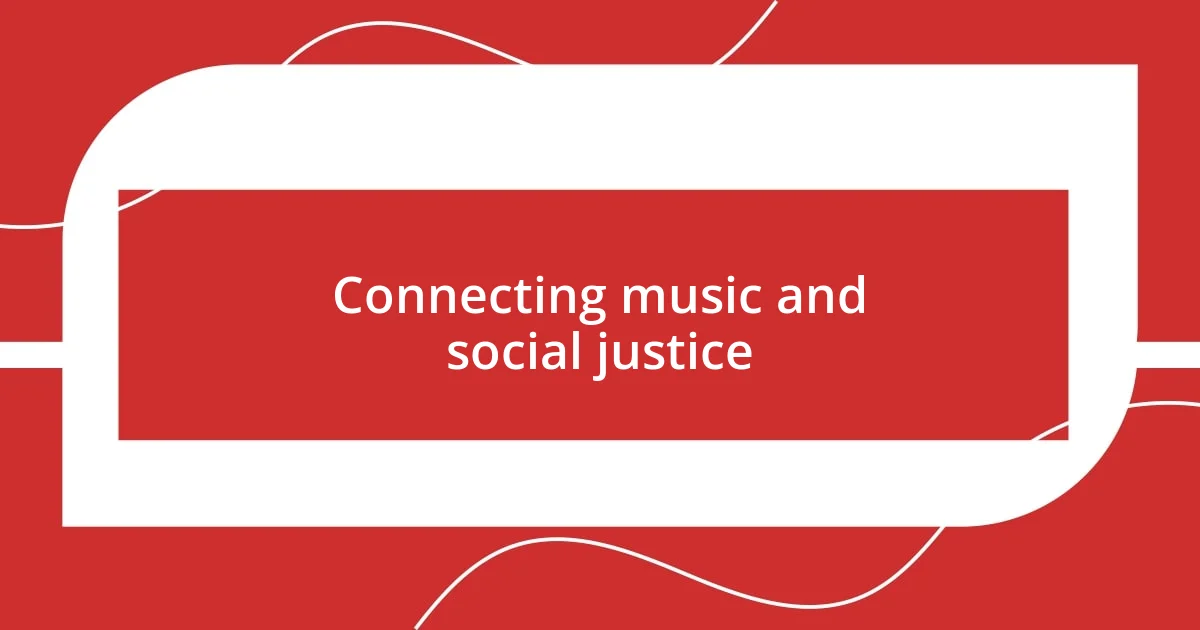
Connecting music and social justice
Music has always been a powerful medium for expressing the struggles and triumphs faced during social movements. I remember attending a rally where a local band played an original song about the need for change. The energy in the crowd was palpable, and in those moments, I couldn’t help but wonder—what if everyone felt empowered to share their stories through song?
Through my own experiences, I found that music provided a sense of community and solidarity among activists. One night, I gathered with friends to write lyrics about our frustrations and hopes. The act of creating together not only strengthened our bonds but also helped us channel our emotions into something constructive, reminding me that every chord struck could resonate far beyond our immediate surroundings.
I’ve often felt that music serves as both a catalyst and a balm in times of unrest. During a particularly intense period of activism, I would blast certain tracks on repeat, letting the lyrics stir up my emotions while grounding me in the cause. Can you relate to that feeling? I believe that when we connect with music rooted in social justice, it invites introspection and ignites a passion that transcends words—the collective heartbeat of a movement, if you will.

Personal stories of music’s influence
I’ve always found that music can be deeply transformative, especially during challenging times in activism. Reflecting on my own journey, I recall a period where I would listen to a particular album that resonated with my struggles. Its lyrics mirrored the frustration I felt, almost as if the artist was speaking directly to me. It became more than just a soundtrack; it was a refuge, a way to articulate feelings I couldn’t express. Have you ever experienced that special connection to a song that just makes everything feel a bit lighter and more manageable?
In one memorable experience, I participated in a singing workshop aimed at promoting peace. As we harmonized together, I felt an overwhelming sense of belonging. Each note echoed the shared hopes we had for a better world, bridging the gaps between us. The power of those melodies lingers in my memory, reminding me of the strength we found in unity. It’s incredible how music has a way of breaking down barriers and creating community, don’t you think?
During a critical moment in my activism, I discovered a playlist that spoke deeply to the issues at hand. Listening before going out to march, my nerves transformed into determination, with every beat fueling my commitment to the cause. It’s interesting how specific songs can act as personal anthems, becoming almost ritualistic before stepping into the fray. For me, those rhythms were not just entertainment; they were a call to action, an invitation to participate in the larger narrative of change. Have you ever had a song ignite that kind of fire in you?
| Personal Anecdote | Emotional Insight |
|---|---|
| Connection through Lyrics | Transforms frustration into understanding |
| Singing for Peace | Creates unity and belonging |
| Ritual of Empowerment | Transforms nerves into determination |
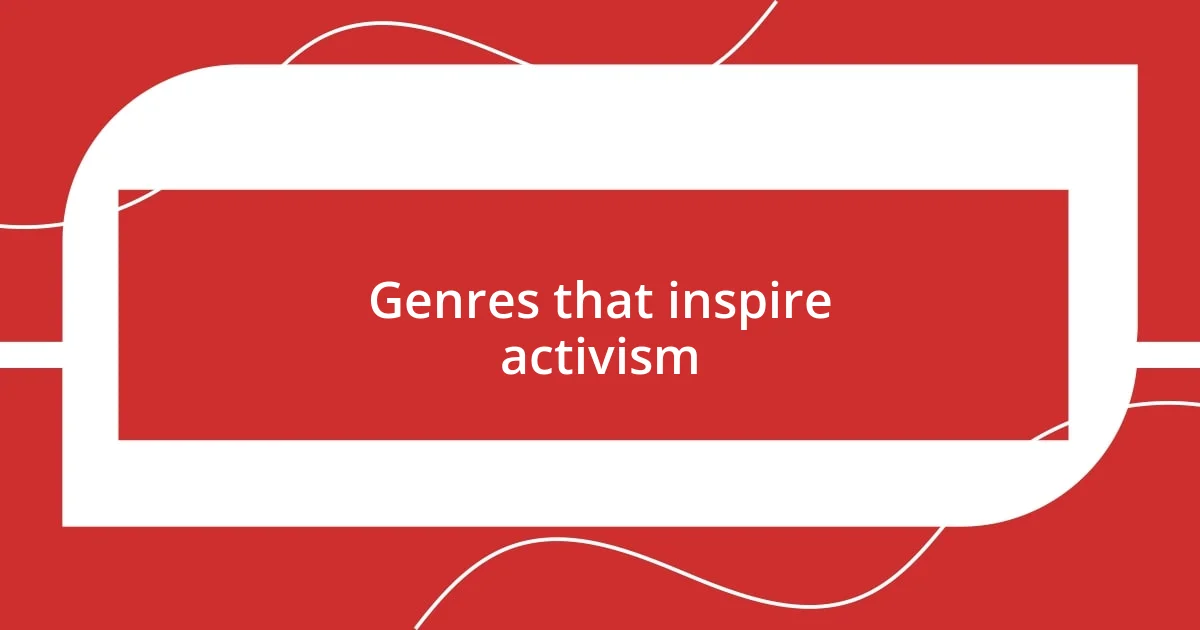
Genres that inspire activism
When I think about genres that inspire activism, hip-hop immediately comes to mind. There’s something uniquely raw and powerful in its storytelling. I once attended a spoken word event featuring a hip-hop artist who painted a vivid picture of systemic injustice. His words struck a chord with everyone there, reminding us of our common struggles. In that moment, I felt music’s ability to bring realities to light, sparking conversations and driving change.
Other genres also contribute to this vibrant tapestry of activism. Here’s a quick look at some that inspire passion and action:
- Folk Music: Often recounts tales of social justice struggles and resonates with a sense of community.
- Reggae: Rooted in themes of resistance and freedom, its rhythms invoke a powerful sense of unity.
- Punk: Challenges authority and norms, channeling youthful rebellion into a call for change.
- Rock: Frequently serves as anthems for movements, rallying people around shared ideals.
- R&B: Expresses personal and collective pain, crafting narratives that touch hearts and motivate action.
Every genre has its unique way of amplifying activism, bringing together voices that might otherwise go unheard. I’ve felt those diverse rhythms pushing me to engage, reminding me that music is more than a soundtrack—it’s a movement.
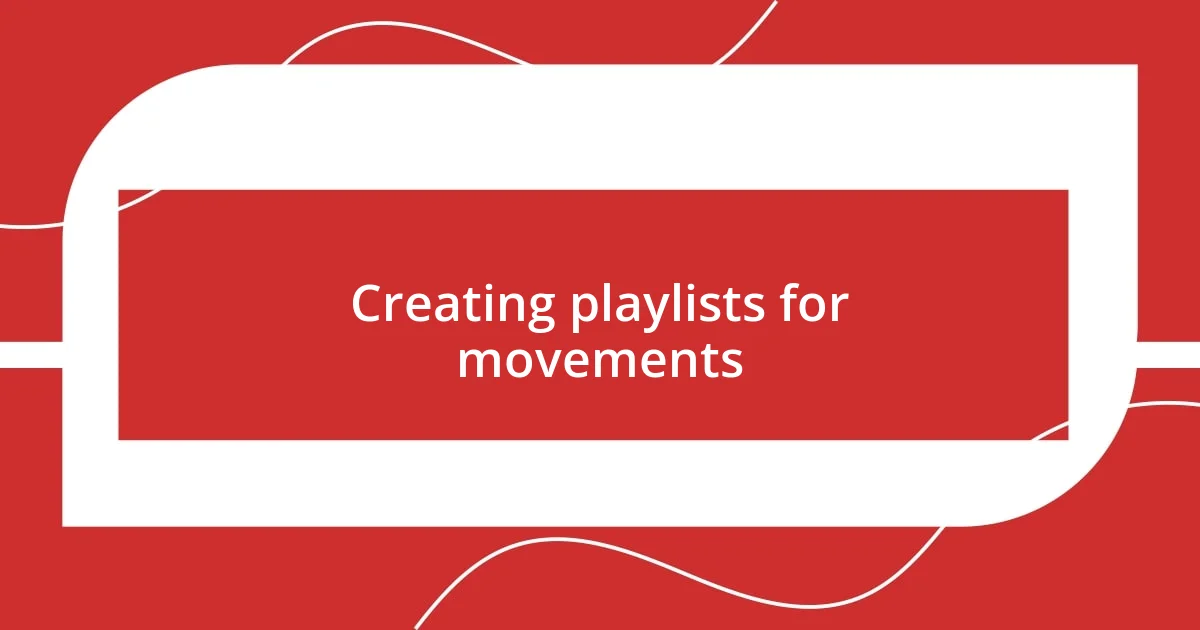
Creating playlists for movements
Creating playlists for movements has been a revealing experience for me. I remember curating a playlist specifically for a climate action rally. Each song was selected not only for its rhythm but for its message, echoing the urgency of the crisis. It’s fascinating how a thoughtfully crafted playlist can effectively rally people together, don’t you think?
A standout moment was when I played that playlist for friends before we headed out. As the beats filled the room, I could see their energy shift; they were no longer just casual participants, but passionate activists ready to make a difference. The right track can turn apprehension into exhilaration, transforming a room full of individuals into a cohesive force of change. It’s like music acts as a glue, binding us in purpose.
In creating playlists, I often think about the emotional highs and lows we encounter in activism. I’ve learned that balancing upbeat anthems with softer, reflective tracks can help ground us. This emotional ebb and flow creates a space where we can feel both empowered and introspective. Have you experienced how the right song can strike a deep chord, leading to a moment of clarity? Those playlists become more than just music; they are emotional journeys that fuel our movement’s spirit.
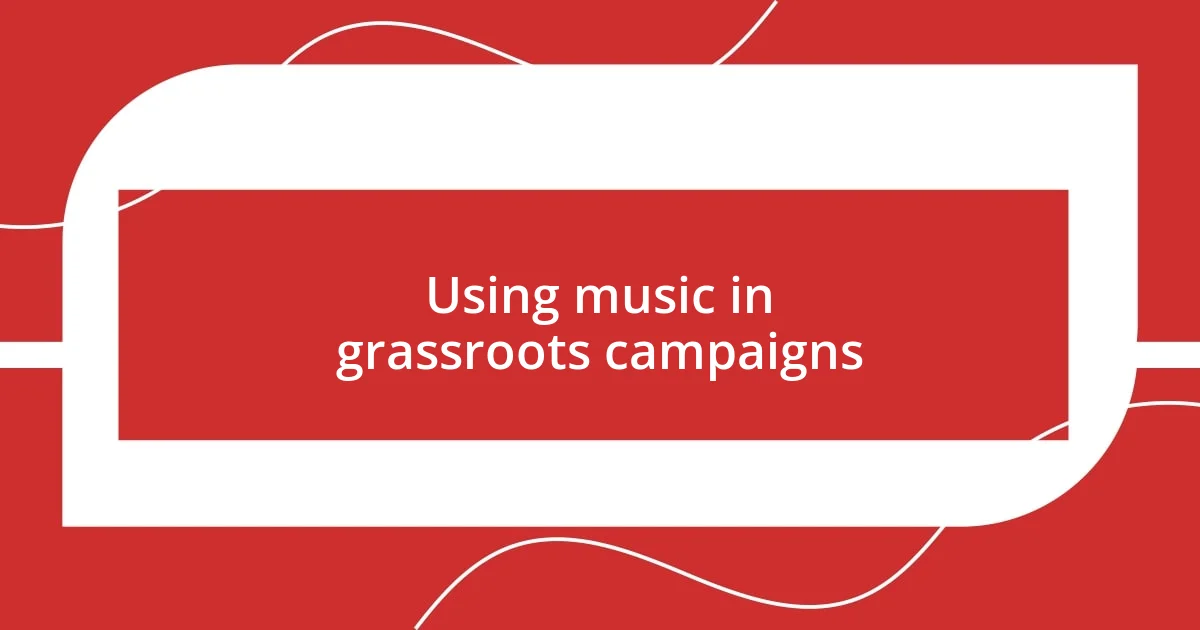
Using music in grassroots campaigns
Using music in grassroots campaigns can be a powerful amplifier for messages and movements. I recall participating in a local rally where a group of musicians performed right in the heart of the crowd. Their lyrics weren’t just entertaining; they resonated deeply, perfectly aligning with the campaign’s mission. Watching people sing along felt like building a sense of community and shared purpose, reinforcing why we were there together.
One memorable experience for me was during a community clean-up event, where a live band played songs that encouraged participants to keep pushing despite the heat. As the rhythm pulsed through the park, I felt an undeniable shift in the atmosphere; it transformed hard work into a joyous occasion. Isn’t it incredible how music can create a motivational backdrop that inspires people to not only participate but to enjoy the process of activism itself?
Incorporating familiar tunes into grassroots messaging can elevate the emotional connection to the cause. I remember when we used a popular protest song during a local meeting to introduce our campaign. Instantly, everyone recognized it and started singing along, which sparked an emotional bond among participants. It’s moments like these that underscore music’s unique ability to unite and energize; it reminds us that even in the struggles we face, we’re not alone in this journey.


